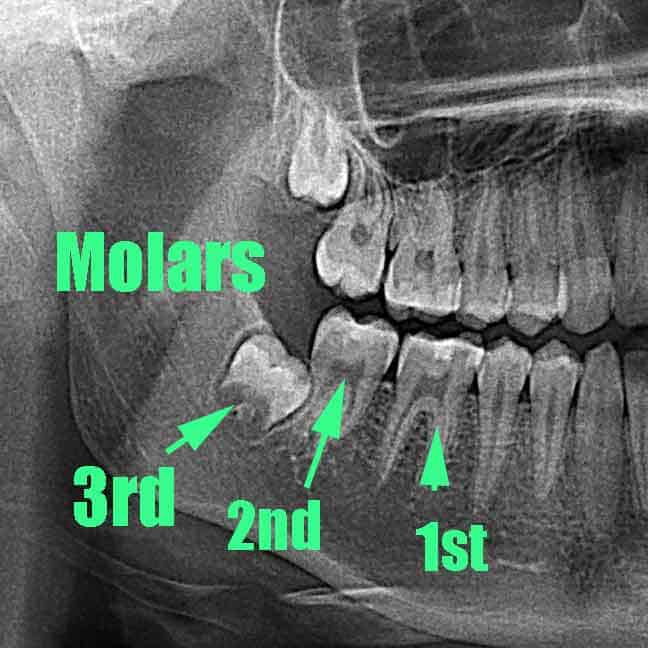Has wisdom tooth extraction been recommended for you or your child? If so, you probably have some questions regarding why they need to be removed. You also might be wondering what to expect during and after the oral surgery procedure. Here are the answers for common questions about extracting impacted third wisdom teeth, also known as third molars.
What are Wisdom Teeth?

Wisdom teeth are the molar teeth furthest back in the mouth. They are also called third molars because they are the third set of molars to erupt through the gums and into the mouth. The first molars commonly erupt at age five – seven. The second molars come in at about twelve years of age. The wisdom teeth are positioned behind the second molars but are often not seen. This is because they can get trapped under the gum if the jaw is too small, preventing them from erupting into the mouth.
What age do wisdom teeth come through gums?
For most people, wisdom teeth attempt to break through the gums between the ages of seventeen and twenty-one.
Does everyone have wisdom teeth?
Not everyone grows wisdom teeth. But the majority of people do get four wisdom teeth. Some people even develop a second set of wisdom teeth. These “fourth molars” are often called supernumerary teeth. It is also common for a person to develop three or fewer wisdom teeth. Dentists take a panoramic x-ray to determine how many wisdom teeth a patient has. This x-ray also helps determine if the third molars will need to be removed.
Why do wisdom teeth need to be extracted?
Wisdom teeth need to be extracted if they cause pain, infection, swelling, gum disease or pose a risk of damage to the neighboring teeth. In some cases, the teeth can erupt without causing any of these issues and do not need to be removed. Wisdom teeth infections are serious. Therefore, dentist’s try to predict, with x-rays, if the risk of infection is high. Based on the radiographic exam a dentist may suggest extraction. Alternatively, a dentist will recommend leaving the teeth in place or follow-up examination in the future as the wisdom teeth grow into position.
Should wisdom teeth be removed?
Wisdom teeth should be extracted if they are causing an immediate problem such as pain, swelling or infection. However, most often the decision to remove third molars is made prior to any symptoms or infection. Each person’s jaw development is unique. Therefore the choice to remove third molars is made after a personal dental examination and thoughtful planning. Click this link to learn more: “Should Wisdom Teeth be Removed”
What can happen if I don’t get my wisdom teeth removed?
With luck, your third molars won’t need to be extracted.
However, if your jaw is too small to allow all your teeth to completely erupt through the gum tissue, then the best answer is early tooth removal. This is because preventing dental pathology is much better than any available treatment. Early extraction prevents gum disease, and adjacent tooth damage. Importantly, many of the problems caused by wisdom teeth can’t easily be resolved with dental treatment.
If you don’t get impacted wisdom teeth extracted, infection or damage to the second molars can occur. The usual problems are infection, gum disease, decay, second molar damage and TMJ pain. Fortunately, most of the harm caused by third molars is easy to prevent. Commonly, dentists will take a panoramic x-ray between age fifteen – seventeen. This radiography will answer the questions: Do the wisdom teeth require extraction and if so, when?
It’s best to prevent problems caused by molar impaction rather than try to treat the consequences. If third molar extraction is indicated, early treatment is most comfortable, least time consuming and yields the best results.
How long does it take to recover from wisdom teeth removal?
After the surgery, you will probably take a long nap as a result of the medicine that the dentist uses to sedate and anesthetize the mouth. On the day after surgery you should relax, avoid strenuous exercise and eat a soft diet. Swelling and bruising which may occur will begin to reduce at 72 hours following the tooth removal. It often takes a week or two before a patient can begin to open their mouth widely without discomfort.
Does a persons age and the position of the impaction affect healing time?
When fully erupted wisdom teeth are removed, patients can return to work the next day. However, in the case of fully impacted teeth, people usually relax at home on the day of surgery and then over an additional two-day period before returning to normal activity.
It’s important to realize that a patients age, health and the position of the impacted teeth have a big affect on healing and recover time.
How much does removing your wisdom teeth cost?
The total price depends on the cost of sedation, diagnostic x-rays, examination and the cost of the actual extractions. The extractions themselves normally cost between $185 – $400 per tooth. The price variation is dependent on the position of the teeth. Dental insurance often covers a significant portion of the cost.
Roman Kotlarek, D.D.S. practices in West Houston and has reputation for gently removing wisdom teeth with the benefit of I V sedation to minimize discomfort. If you have questions about wisdom teeth removal or want to schedule an appointment, please call Roman Dental at (281) 920-4200. Alternatively, book an in-office consultation 24/7 online at www.romandental.com









